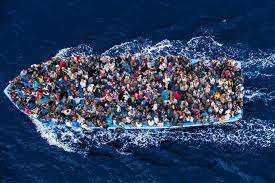
In this blog I speak a lot about globalization and migration. I discuss the matters of international business, cross-cultural communication, global talent and borderless workers. Mostly, when speaking about migrants here, I tend to refer to the skilled, educated and globally minded ones. Yet, although not fully serving the purpose of this blog, the matter of the ‘other’ migrants is something difficult not to talk about at the moment. Following April’s horrific migrant drowning accidents in the Mediterranean sea it finally seems ‘official’ that Europe is facing a migration crisis. Over the past several months the crisis has been a hot topic of many news headlines, reporting on the heated debates among European leaders. While some debate over how to stop migrants, others about how to save them…
According to some of the presented statistics, already over 1600 migrants have lost their lives trying to cross the Mediterranean sea in search of asylum in 2015. Moreover, worldwide 75% of migrant deaths occur in the Mediterranean sea, and the numbers are expected to grow further, given that the peak migration season has just begun. Looking at such numbers, finding solutions and quickly reacting upon the crisis seems to be a matter of human morale. At the same time, not yet fully recovered from economic recession the European countries experience a rise in anti-immigrant attitudes and, generally, xenophobia. As reported, many EU countries are not happy with plans for the relocation of 40,000 refugees arriving to Italy and Greece to other EU countries. Naturally, the main questions concern the lack of employment opportunities for locals, let alone the potential migrants, as well as generally pessimistic outlooks of migrant integration. Indeed, for many locals the immigrant riots in Sweden or other European countries are obvious examples to turn to.
The debate of the migration crisis seems to be well-illustrated on Italian island of Lampedusa, where boatloads of migrants arrive. According to a Washington Times article, perceptions towards immigrants on the island are twofold, as expressed by one of the shop owners: ‘I recognize these people are in search of a better life, but something has to be done. They are keeping away the paying customers.” As such, it seems that for many the current debate resolves around a choice to make: our well-being OR their well-being. A similar perception is depicted in a recent Guardian article, which suggests that ‘At its heart, the inherent tension in the asylum-seeker debate is a conflict of competing rights, and of concern over control. Nations have a sovereign right, and governments a responsibility to their citizens, to control their borders. But people facing persecution have a legal right to seek asylum, and the nature of their arrival is mandated in law not to be prejudicial to their claim or treatment’.
Naturally, as long as it is an either-or decision for Europeans, the attempted solutions will remain minimalistic, while the crisis itself will continue escalating. As the Guardian article suggests, solving the migration crisis should start with changes in the ways we perceive and see refugees. Maybe these solutions should involve further globalization, which would entail planned and orderly movement not only of the ‘useful’ migrants (the educated and skilled ones), but also the ‘needy’ migrants ‘pushed’ away from their countries by different negative circumstances?
In the book Borderless Economics, British business editor Robert Guest makes the case that everyone benefits from migration and argues that ‘in the battle against global poverty, the best weapon is a welcome mat’. Summarizing his arguments in an article, Guest illustrates how brain drain from poor countries begets globalization and benefits both, the host and home countries. Then again, he speaks about talent, migrants with skills, migrants ready to work. But what about refugees?
The current migration crisis is about refugees, and that means we need to find compelling reasons for rolling out the welcome mat, finding global and long-term solutions that would support the well being of all parties involved. The current migration crisis remains currently unsolved.

